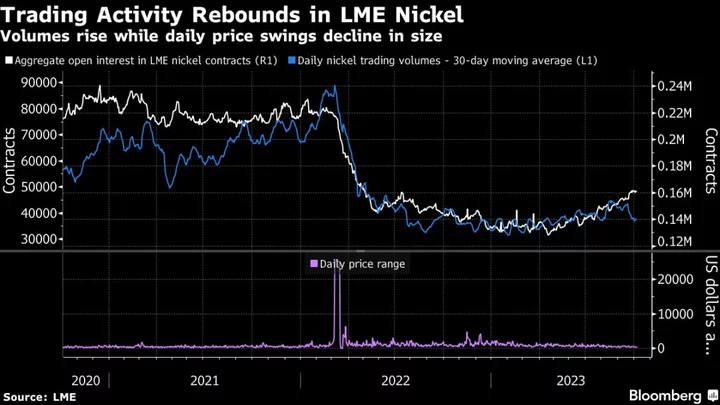The chief executive of the London Metal Exchange says he’s optimistic that the 146-year-old trading venue is beginning to move on from the nickel crisis that threatened to destroy it.
It’s been a turbulent 19 months since Matthew Chamberlain responded to a runaway short squeeze by suspending the world’s benchmark nickel market and canceling $12 billion of trades. The controversial decisions drove angry investors away from the LME and left the exchange wading through lawsuits and regulatory scrutiny, while its nickel contract remained in tatters.
Now, Chamberlain is sounding a cautious note of optimism. “A degree of stability” has returned to the nickel market, he said in an interview, pointing to rising liquidity and lower volatility. And in the exchange’s other metals contracts, trading volumes are showing early signs of a return to growth after years of decline.
“It feels that we are back on that gentle growth trajectory,” the CEO said. “We recognize the challenges that have happened but we think we can hold our head up and say ours is an exchange that’s attractive to trade on,” he said. “There’s a lot more work to do, but we can really focus on the future.”
As the home of benchmark prices for key metals from copper to zinc, the LME lies at the heart of the global metals world — and any crisis or drama at the exchange inevitably sends ripples through the whole industry.
Since taking the helm six years ago, Chamberlain has had his share of fights, from an attempt to close the LME’s historic trading floor to disagreements over whether it should keep accepting Russian metal, and of course the handling of the nickel saga.
This week, as thousands of traders, financiers and investors descend on London for the annual LME Week gathering, Chamberlain can point to concrete signs that his efforts to restore confidence in the market are starting to bear fruit. Nickel trading volumes have picked up in the past few months and the extreme volatility that plagued the nickel market for much of the past year is waning, although the contract still remains a shadow of its former self.
Trading activity in other metals is also on track to halt a years-long decline that’s been a constant headwind to Chamberlain’s efforts to raise revenues for the LME and its owner, Hong Kong Exchanges & Clearing Ltd. With rivals circling, the turnaround comes at a crucial time.
But Chamberlain’s challenges aren’t over yet. The LME has a significant risk still hanging over it as it awaits the outcome of a legal battle with hedge fund Elliott Investment Management and trading firm Jane Street, which challenged the legality of its decisions during the nickel crisis and are seeking $472 million in damages. A judgment in the case is expected in the next couple of months.
A group of other firms including AQR Capital Management have also sued the LME separately, while the exchange is being investigated by the UK’s Financial Conduct Authority over its handling of the crisis.
Meanwhile, Chamberlain is pushing ahead with measures to modernize the exchange and fix some areas of its market structure that were criticized in an independent probe into the crisis.
The LME has already announced a series of reforms in the wake of the nickel squeeze, including a requirement that dealers and clients report their over-the-counter positions.
The rules give the LME greater visibility on a corner of the market that previously represented a huge blind spot — and which the exchange has said was a key driver in last year’s crisis, when nickel producer Tsingshan Holding Group Co. and other holders of short positions had racked up billions of dollars in off-exchange trading losses with bilateral counterparties unbeknown to the LME.
However, Chamberlain is also seeking to encourage dealers to place more of their trades electronically, rather than in the LME’s large telephone-based market or bilaterally in over-the-counter deals. It’s much cheaper to trade on an OTC basis, and some in the industry are bracing for the possibility that the LME could raise a levy on the trades.
Chamberlain wouldn’t disclose how OTC volumes have changed over the past year, but said that anecdotally it appears the market remains “very active.” He confirmed the LME is examining the cost difference, without commenting on what steps it might take to draw more business onto the exchange.
Overall, the CEO said he’s optimistic that the LME has turned a corner after last year’s turbulence.
“While we accept that there is a huge amount more to do, we feel that the market is in a stable place,” Chamberlain said. “That gives a little spring to everyone who’s involved in the market.”

